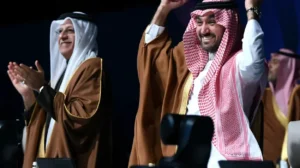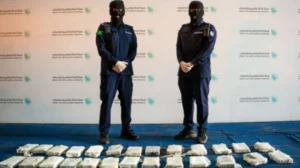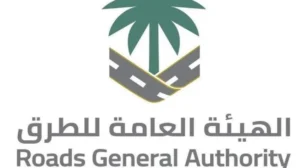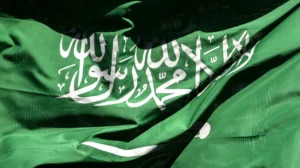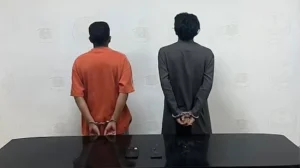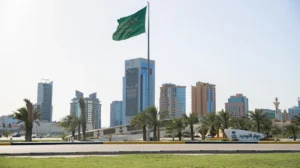- Home
- Why Boycott?
- Human Rights Violations
- Migrant Workers Exploitation & Kafala System Abuse
- Saudi Arabia’s War Crimes
- Freedom of Press and media censorship
- Torture And Unfair Trials
- Saudi Arabia’s Anti-Climate Agenda
- Bogus Stadium Infrastructure
- Sportwashing & Political image
- Saudi Arabia’s Unfair bidding Process
- FIFIA Corruption and Transparency issues
- Poor Treatment of LGBTQ community
- Security risks for spectators
- News
- Get Involved
- Contact Us
Saudi Arabia & Extremism
Saudi Arabia & Extremism: Exposing the Nexus Behind the 2034 FIFA World Cup
As Saudi Arabia prepares to host the 2034 FIFA World Cup, global attention is shifting toward the kingdom’s long-standing ties to extremist ideologies and their implications for international security, regional stability, and the values FIFA claims to uphold. While the Saudi government positions itself as a modernizing force, a closer look reveals an ongoing and deeply concerning relationship with extremist groups, radical clerics, and fundamentalist networks. This article unpacks that complex history — and why it matters in the context of hosting the world’s most celebrated sporting event.
The Roots of Extremism: Saudi Wahhabism and Global Radicalization
At the heart of Saudi Arabia’s connection to extremism lies the state-sponsored promotion of Wahhabism — a puritanical interpretation of Islam that has shaped Saudi identity for decades. Since the 18th century alliance between the House of Saud and Muhammad ibn Abd al-Wahhab, this doctrine has been exported worldwide through Saudi-funded mosques, schools (madrasas), and literature.
Over the past four decades, especially following the 1979 Iranian Revolution and the Grand Mosque seizure in Mecca, the Saudi state doubled down on exporting its ideological influence as a counterbalance to Shia Iran. Billions of petrodollars were funneled into disseminating ultra-conservative religious teachings across Asia, Africa, the Balkans, and even parts of Europe.
The result? A global network of religious institutions that in many cases have fostered intolerance, sectarianism, and, at times, outright violence.
Financing Extremism: Between Denial and Complicity
Though the Saudi government has often denied direct links to terrorism, numerous intelligence reports, academic studies, and counter-terrorism investigations have drawn lines between Saudi citizens, charities, and financial institutions and extremist organizations such as al-Qaeda, the Taliban, and more recently, ISIS.
According to a leaked 2009 U.S. State Department cable published by WikiLeaks, “donors in Saudi Arabia constitute the most significant source of funding to Sunni terrorist groups worldwide.” While the kingdom has introduced laws to curtail this flow, enforcement remains selective and often politically motivated.
Moreover, Saudi institutions have a track record of failing to monitor how religious scholarships and NGO funding are used abroad. In countries like Pakistan, Indonesia, and Bosnia, Saudi-backed institutions have contributed to radicalization, undermining local Islamic traditions in favor of rigid, Saudi-approved interpretations.
9/11 and the Unanswered Questions
The September 11, 2001 attacks remain a defining moment in the discussion around Saudi Arabia and terrorism. Of the 19 hijackers, 15 were Saudi nationals. The official 9/11 Commission Report found that Saudi Arabia was not institutionally complicit, but it did not absolve the country of responsibility for creating the ideological and financial ecosystem that enabled such attacks.
Further revelations, including the partial declassification of the long-withheld “28 pages” from the U.S. Joint Inquiry into the attacks, raised questions about alleged connections between individuals linked to the Saudi government and the hijackers. While definitive evidence remains elusive, the pattern of opaque financing, diplomatic shielding, and reluctance to prosecute prominent individuals is telling.
FIFA’s Ethical Dilemma: Rewarding a Regime with Extremist Links
FIFA claims that its tournaments stand for peace, tolerance, and global unity. Yet, awarding the 2034 World Cup to a nation with a documented history of exporting extremist ideology and undermining international peace efforts sends the opposite message.
By choosing Saudi Arabia without a competitive bidding process or human rights evaluation, FIFA effectively rewards a regime that has contributed to the ideological climate that fuels global terrorism. The decision raises questions about FIFA’s integrity, especially after the post-Qatar 2022 reforms aimed at prioritizing transparency and human rights.
Modernization or Whitewashing? MBS’s Double Game
Crown Prince Mohammed bin Salman (MBS) has attempted to portray Saudi Arabia as a modern, progressive nation through Vision 2030. This includes lifting certain restrictions on women, opening up to tourism, and promoting entertainment and sports. However, these changes have not translated into dismantling the ideological infrastructure that underpins extremism.
In fact, while concerts and cinemas are now permitted, critics of the regime — including moderate Islamic scholars, secular intellectuals, and women’s rights activists — remain jailed, tortured, or silenced. Simultaneously, hardline clerics who support the monarchy continue to be given platforms, underscoring the regime’s selective and performative approach to reform.
Regional Destabilization: Yemen, Syria, and Proxy Wars
Saudi Arabia’s foreign policy also contributes to extremism and conflict across the Middle East. Its military intervention in Yemen, launched in 2015, has created one of the world’s worst humanitarian crises, with thousands of civilians killed and millions displaced. The Saudi-led coalition has been accused of indiscriminate bombings, blockade-induced famine, and war crimes.
In Syria, while opposing Bashar al-Assad, Saudi Arabia supported various rebel factions, some of which had links to jihadist networks. Rather than promoting democracy, these interventions often intensified sectarian conflict and strengthened extremist groups.
Exporting Repression: The Global Reach of Saudi Surveillance
Extremism is not only about bombs and ideology — it’s also about silencing dissent. Saudi Arabia has aggressively pursued dissidents and exiles abroad using surveillance, spyware (such as Pegasus), and coercion. The murder of journalist Jamal Khashoggi in 2018 in the Saudi consulate in Istanbul remains the most chilling example of this trend.
In many cases, exiled activists, journalists, and academics have reported threats, hacking attempts, and even detention of family members in Saudi Arabia as a means of leverage. This authoritarian overreach is part of the broader extremist ecosystem — one that punishes any deviation from absolute loyalty to the regime.
Why This Matters for the World Cup
The 2034 FIFA World Cup is not just a sporting event — it’s a global platform. Hosting it in Saudi Arabia risks legitimizing a regime whose influence has often undermined peace, diversity, and coexistence. For players, fans, and journalists from across the globe — particularly from LGBTQ+ communities, democratic societies, or countries affected by terrorism — the decision raises profound ethical concerns.
How can we celebrate unity in a nation where diversity is punished? How can we cheer for fair play under a regime that suppresses dissent and finances conflict abroad?
Growing Calls for Accountability and Reform
The international community is beginning to push back. Activists, NGOs, and even some football federations are questioning FIFA’s decisions and calling for transparency in future tournament allocations. Some propose strict conditionality for Saudi Arabia’s hosting rights — including measurable improvements in human rights, freedom of speech, and anti-terrorism accountability.
The growing #BoycottSaudi2034 campaign reflects this shift. It’s not just about politics; it’s about protecting the spirit of the game from being hijacked by authoritarian regimes with extremist legacies.
Reclaiming the Spirit of Football
Saudi Arabia’s ties to extremism are not a relic of the past. They are active, evolving, and often state-enabled. While the regime invests billions to sanitize its image through sportswashing, it continues to export intolerant ideologies, suppress dissent, and destabilize regions in pursuit of political dominance.
Awarding the 2034 FIFA World Cup to such a regime undermines the values of equality, safety, and global solidarity. The world must decide whether to play along — or to stand up for a vision of football that transcends profit and propaganda.

